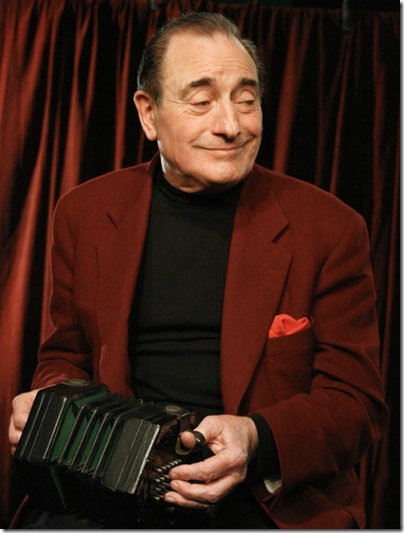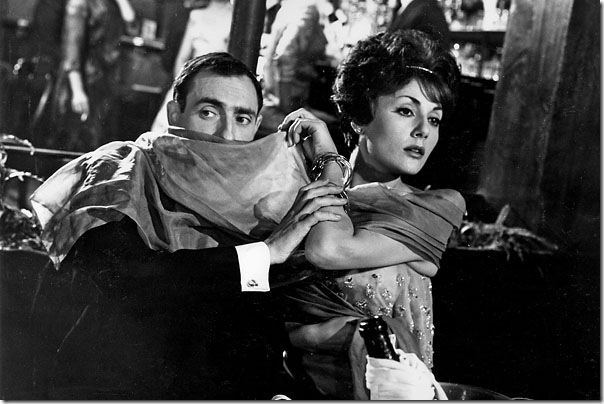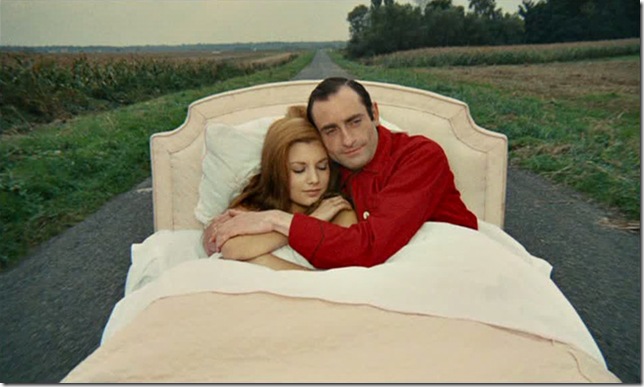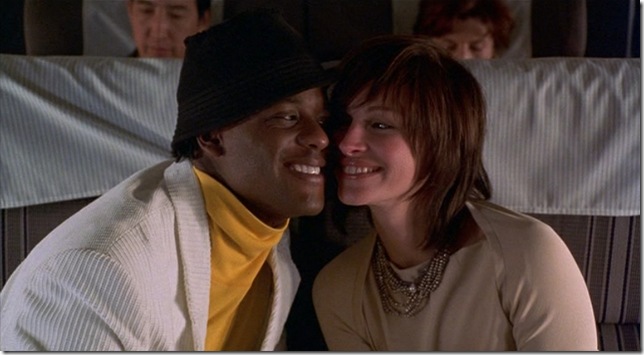Unavailable for more than four decades thanks to legal disputes and film stock degradation – take your pick – the five feature films and three shorts from French auteur Pierre Étaix have finally been digitally restored and released on home video, and they’re absolutely irresistible (Criterion, $43.83 Blu-ray, $36.83 DVD).
A clown both before and after his surprisingly limited film career, Étaix trained as an assistant director under Jacques Tati before embarking on a movie career in the ’60s, and much of his work feels like a bonkers waystation between Tati and Frank Tashlin. After watching these features, it’s an absolute shame they were buried from the public for so long, because they’re both stylishly innovative and universally engrossing – probably the most accessible, audience-friendly oeuvre to be denied the light of day.
Like the great comic directors of the silent era, Étaix himself was the star of his movies as well as their director and co-writer. He has an unmistakable camera presence. Pale, slim, hollow-cheeked and often dressed like a mortician, he exudes some of the deadpan laconicism of Buster Keaton, dutifully accepting whatever indignities nature has in store for him. In his earliest material, he casts himself as a frequently unlucky romantic, always a day late and a dollar short. In the award-winning Happy Anniversary (1962), an epic Parisian traffic jam prevents him from making it home from work; his wife consumes their immaculately displayed anniversary dinner and passes out on the table.
In his first feature, The Suitor, he plays the slugabed scion of a wealthy family, pressured by his parents to get married. The film plays out episodically, like many of Étaix’s comedies, following his awkward courting rituals, his misadventures with a dotty lush he picks up at a bar, and his obsession with a popular cabaret singer. The story becomes virtually irrelevant, second to the gags. There’s barely any dialogue; Étaix uses an economy of words in his first films, and they’re more for added color than story comprehension. Instead, he revels in slapstick routines with the delicacy of mousetraps, hitting us with the logical results of a string of illogical actions, and in clever visual puns: What looks to be a miniature rocket launch turns out to be a cigarette ascending toward Étaix’s lips, and when he later approaches a leash-carrying woman with a dog treat, the pup turns out to be a child, absurdly dragged through the park on a leash.
Watching Étaix’s films, you learn to expect the unexpected, aurally as much as visually. He succeeds at some profound experiments with sound in these movies, mastering the utility of chaos and clangour as much as utter silence. In The Suitor, the Étaix character turns a sound film into a completely silent one whenever he inserts earplugs, resulting in much inspired amusement. In As Long as You’ve Got Your Health, a collection of four shorts from 1966, he blankets one of them in the ceaseless drill of a jackhammer, part of a city symphony of pollution, air and noise alike. And in 1965’s Yo-Yo, the first third of the film is silent, aided only by exaggerated Foley effects for squeaky doors and rickety desks. There’s a logical reason for the silence, we soon find out: The first part of the film is set in the era before the talkies. When it moves into the tail end of the ’20s, we can suddenly hear the world.
Yo-Yo already marked something of a turning point for Étaix, even though it was only his second feature. It’s more sentimental than The Suitor, less inclined toward a joke-a-minute aesthetic, more Chaplinesque than Keatonesque this time around (the Little Tramp is even referenced in a segment on Hitler, echoing The Great Dictator). Étaix plays a rich bachelor who can summon dancing flappers with a snap of his fingers, but he harbors an unquenchable longing for an old flame. Finally he sees her: She’s a circus performer, and she’s given birth to his child, whom he meets for the first time.
With the economy crashing, he’s forced to abandon his manse, so he lives with his wife and son in their traveling circus. Years pass, and we begin to follow the child as a grown-up (played again by Étaix), who has become a professional clown, entertaining through the Second World War and the development of television, which threatens to eliminate itinerant entertainers. Needless to say, this is Étaix’s most personal fiction and his least funny. It’s not my favorite, but I’m sure for others it is.
I’m partial to 1969’s Le Grand Amour, Étaix’s only dialogue-driven feature, which proved that he had a verbal wit as well as visual sophistication. It’s also his only full-color feature, and it’s gorgeous to look at on this Blu-ray, which makes the most of his popping primary color palette. It’s about a man (Étaix, of course) who marries the wrong girl at the wrong time in his life, pressured by his future parents-in-law to eschew bachelorhood and settle down. He’s promised a job at his father-in-law’s tannery, which he accepts, only to find himself, 10 years later and in a top managerial position, so smitten with his new 18-year-old secretary that he will put his marriage and job at risk.
Complete with hysterical and existential fantasy cutaways, including a brilliant bit about a couple dividing its possessions in half, the film is a thoughtful and hilarious meditation on suppressed passions, the cerebral conflict between guilt and desire, and the asinine grab-ass of middle-aged male malaise. With its caustic maturity and stylistic playfulness, Le Grand Amour might be Étaix’s Annie Hall.
And if it is his Annie Hall, then the director’s follow-up, The Land of Milk and Honey, is certainly his Interiors, a Very Serious Movie and the only misfire in this otherwise superlative box set. Arriving way out of left field, this film, made on commission by a local network, finds Étaix diving into ethnographic documentary, interviewing participants in an amateur talent roadshow about violence, eroticism, fame, music, urban sprawl, advertising, art versus commerce, and the other issues of post-1968 France, interspersing their comments with obviously ironic images of carefree tourists lounging at beaches and campsites.
Why a great comedian like Étaix would have any interest in making a Jean-Luc Godard or Jean Rouch film is beyond me, and sitting through this one was a real chore. The best part is Étaix’s introduction, in which he pretends to be interviewed about the film by a reporter. He describes the 130,000 feet of film he used to shoot the movie, and all of a sudden he’s overrun by the excess film strips: They’re everywhere, chasing him down stairways, burying the interviewer, raining down on his car like a cinephile’s vision of The Blob. In titles like Yo-Yo and Le Grand Amour, Étaix already evolved from his protean formulas, but this short introduction to an otherwise snoozy film is a reminder that sometimes, we just like to see somebody do what they do best.
In Hong Sang-Soo’s In Another Country (Kino, $23.22), a young woman sits down and begins to write. From her pen spring three separate but interconnected stories about three French women – all of whom are played by Isabelle Huppert – who visit a coastal town in South Korea. In the first, she’s a famous film director; in the second, she’s an adulteress meeting her lover; and in the third she’s a divorcee traveling with an interpreter. In all of these stories, she develops a relationship with the local lifeguard, a smitten man eager to win her over in comically broken English. Huppert imbibes a lot of soju in all of the stories, too, leading her to mix reality with drunken reveries.
For Hong, whose rich body of work includes Night and Day and The Day He Arrives, the film presents three more variations on his preferred theme of foreigners marooned in other countries, and anyone who has struggled to communicate in a foreign country will find plenty to relate to in the plotless rambles of In Another Country. Not everyone will be charmed by this study of identity and culture clash, but I found it frequently hilarious, conjuring mid-period Rohmer, with its talky encounters and beachside locales. And yet, underneath the film’s divisive art-house whimsy lurks a desperation for love and companionship that only so many awkward laughs can mask.
The most inside-baseball flick of Steven Soderbergh’s career, 2002’s Full Frontal (Blu-ray, Miramax, $5.99) was not the director’s first experimental film, but it christened in his ongoing love affair with digital cameras and micro-budgets. He captures a bevy of solipsistic, cranky and/or adulterous Angelinos as they orbit around the production of a fictitious film called Rendezvous, a movie-within-a-movie that happens to be about the making of a movie. Got that?
The “pretty” portions of Full Frontal signify that we’re watching the film-within-a-film, which chronicles the sexual tension between a magazine writer (a wigged Julia Roberts) and an emerging black movie star (Blair Underwood). The rest of it – aka “reality” – is shot on cruddy DV, though even this reveals itself to be its own artifice. Soderbergh’s satire of the film business is certainly pretentious and tiresome – look for the use of faux 3D and jittery jump cuts, just for the sake of them – but it’s also very, very funny, something its detractors either ignore or don’t appreciate.
It’s best approached as a series of self-contained sketches: Roberts’ “off-camera” persona brilliantly inhabiting the role of spoiled diva, David Hyde Pierce trying to resuscitate his dog after it’s consumed a half-dozen pot brownies, Nicky Katt’s Method portrayal of Hitler in an avant-garde play (“I’m swimming in a lake of me right now,” he regretfully tells Eva Braun when she deigns to grow emotionally closer to him). Soderbergh and his screenwriter, Coleman Hough, know how to end a scene with a joke and a punch, and it goes along way toward salvaging this masturbatory treatise.




